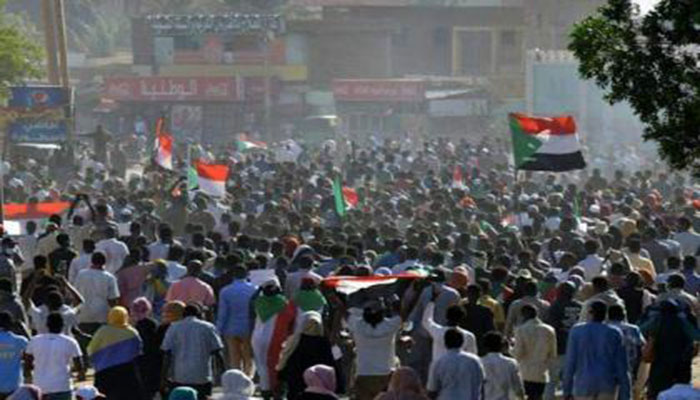Sudan frees several civilian leaders
KHARTOUM: Sudanese authorities have released several civilian leaders detained since last month’s military coup, one of the former captives said on Monday, amid efforts to restore a fragile transition process towards full democracy.
"I was released late yesterday evening," following a deal to reverse the military takeover, the head of Sudan’s Congress Party, Omar al-Degeir, who was among civilians arrested in the army’s October 25 power grab, told AFP.
"I was in solitary confinement and completely cut off from the world throughout this period." The Congress Party, however, slammed Sunday’s deal, saying it "explicitly legitimised the continuation of the coup regime".
Other civilian politicians were also released, including Sedeeq al-Sadiq al-Mahdi of the Umma Party, Sudan’s largest political group. Prime Minister Abdalla Hamdok’s advisor Yasser Arman, a leading figure of Sudan’s mainstream civilian bloc, Forces for Freedom and Change, was among those freed, according to Degeir.
But other key civilian figures and ministers deposed in the coup have yet to be freed. Top general Abdel Fattah al-Burhan last month declared a state of emergency and ousted the government, in a move that upended a two-year transition to civilian rule.
It triggered a wave of mass street protests in which at least 41 people have been killed, according to a pro-democracy doctors’ union. But on Sunday, Hamdok -- who had been placed under effective house arrest -- was released.
He and Burhan then formally signed the 14-point deal that provided for the premier’s reinstatement and for political detainees to be freed. However, analysts warn the move simply "whitewashes" the coup, as it remains unclear how much power Hamdok’s government will yield.
The cabinet will moreover still be under oversight of a ruling council led by the military. Thousands of demonstrators in multiple rallies rejected the deal, shouting, "No to military power" and demanding that the armed forces fully withdraw from government.
The deal was welcomed by the international community, including the United Nations and African Union, as well as the so-called Troika of Britain, Norway and the United States. It was also greeted by Saudi Arabia and Egypt, which have strong ties with the Sudanese military.
-
 Hailee Steinfeld Spills Her 'no-phone' Rule With Husband Josh Allen
Hailee Steinfeld Spills Her 'no-phone' Rule With Husband Josh Allen -
 Bowen Yang Gets Honest About Post SNL Life: 'It’s An Adjustment'
Bowen Yang Gets Honest About Post SNL Life: 'It’s An Adjustment' -
 Charlize Theron Delivers Strong Message At 2026 Winter Olympics Opening Ceremony
Charlize Theron Delivers Strong Message At 2026 Winter Olympics Opening Ceremony -
 Lil Jon Reacts To Son Nathan Smith's Death: 'Devastated'
Lil Jon Reacts To Son Nathan Smith's Death: 'Devastated' -
 Bianca Censori Reveals Where She And Kanye West Stand On Having Children Together
Bianca Censori Reveals Where She And Kanye West Stand On Having Children Together -
 Taylor Swift Hypes Olympic Athletes In Surprise Video Message
Taylor Swift Hypes Olympic Athletes In Surprise Video Message -
 Timothy Busfield Charged With Four Counts Of Child Sexual Abuse
Timothy Busfield Charged With Four Counts Of Child Sexual Abuse -
 Amy Schumer Explains Why Her Sudden Photo Surge Is ‘not A Cry For Help’
Amy Schumer Explains Why Her Sudden Photo Surge Is ‘not A Cry For Help’ -
 Kanye West First Contacted Bianca Censori While In Marriage To Kim Kardashian?
Kanye West First Contacted Bianca Censori While In Marriage To Kim Kardashian? -
 Travis Kelce Reveals What His Nieces Really Do When He, Taylor Swift Visit
Travis Kelce Reveals What His Nieces Really Do When He, Taylor Swift Visit -
 Lola Young Makes Career Announcement After Stepping Back From Touring
Lola Young Makes Career Announcement After Stepping Back From Touring -
 Priyanka Chopra Shares Heartfelt Message For Nick Jonas
Priyanka Chopra Shares Heartfelt Message For Nick Jonas -
 Spotify, Major Labels File $13b Lawsuit Over Alleged Music Scraping
Spotify, Major Labels File $13b Lawsuit Over Alleged Music Scraping -
 Travis Kelce Opens Up About Being Backup Plan For His Nieces
Travis Kelce Opens Up About Being Backup Plan For His Nieces -
 Winter Olympics 2026: Chinese Robot Dance Goes Viral In Milan
Winter Olympics 2026: Chinese Robot Dance Goes Viral In Milan -
 Jessica Biel Urged To Divorce Justin Timberlake?
Jessica Biel Urged To Divorce Justin Timberlake?




